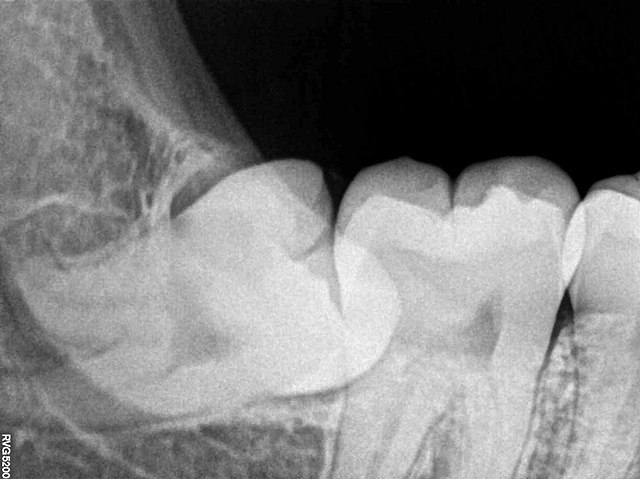
Why do we still have wisdom teeth if we don’t need them? Because they appear after birth, which means it is very difficult for evolution to select against them.
Wisdom teeth are a third set of molars that appear at the very back of the jaw. Molars are the large flat teeth that are used for grinding and chewing food. In most people, wisdom teeth start to come through in the late teens and early twenties. They are quite often removed surgically because they don’t come in properly or they jam against the other teeth. Our jaw is too small for the 32 teeth that we have, and these wisdom teeth just don’t fit.
So, why do we have wisdom teeth if they don’t fit in our mouths, and we don’t need them? They are a vestigial structure that we used to need but no longer do. Our early ancestors were hunter-gatherers and their diet consisted of leaves, roots, nuts, and meat, with bone as well. All of these foods were tough to chew, and we needed extra molars to grind them down. Leaves and roots especially needed to be chewed a lot to break down the plant cell wall because we cannot digest the cellulose in them. This diet meant our teeth would wear down, so an extra set of molars would allow someone to keep the ability to chew for longer.
Many animals that eat hard to chew foods have teeth that never stop growing. Ruminants, such as cows and sheep, constantly chew their food. They digest it in one stomach, then chew it some more before digesting it in another stomach. The stomach that they regurgitate the food from for more chewing is called the rumen, hence their categorization as ruminants. They chew with a grinding movement and wear their teeth down very quickly, which is why their teeth keep growing throughout their lives. Humans don’t have that ability, so we needed more teeth to make up for it.
Then, approximately 15,000 years ago, early humans developed agriculture. There are many reasons why this could have happened. The increasing population could have made a hunter-gatherer lifestyle difficult. Increasing technology could have made agriculture possible. Whatever the reason, when people shifted to agriculture, their diets changed from hard food that had to be chewed a lot to cultivated foods that were softer and easier to eat.
The result of this diet change was that the muscles in our faces have weakened over time and our jaws have shrunk. And these smaller jaws don’t have room for the wisdom teeth that most of us still have. Our bones also became less dense, particularly around the joints, because farming didn’t require the stresses that hunting did.
The changing jaw may also have affected our language. Hunter-gatherers tend to have teeth that lie flat on each other. The teeth are worn down by chewing and the two jaws rest flat on each other. When agriculture was discovered and the food source changed, the shrinking jaw pushed the top front teeth out beyond the lower jaw. This allowed people to pronounce sounds that hunter-gatherers could not. Sounds such as “f” and “v”. Hunter-gatherers already had language, but this change could possibly have made it more complex.
So, if we have evolved smaller jaws that aren’t big enough to hold wisdom teeth, why have we not evolved to lose our wisdom teeth? Well, 35% of people don’t have wisdom teeth, so there is some evidence that we are losing them, but it is not an easy matter. Wisdom teeth don’t start developing until people are in their late teens or early twenties. The reason for this is that the jaw has to be big enough to accommodate them. (It’s not, but it would have been.) Nature believes that by the late teens the person will have grown enough to be able to fit the wisdom teeth in, so it switches them on. The problem with this is that people reach reproductive age before the wisdom teeth are in. This makes it very hard for them to be removed by selective evolution.
So, because we have stopped eating roots and have started cultivating crops, we can no longer fit all the teeth we have in our jaws, which is why our wisdom teeth often have to be removed. And this is what I learned today.
Sources
https://science.howstuffworks.com/life/evolution/no-wisdom-teeth.htm
https://www.newscientist.com/article/dn13615-evolution-myths-everything-is-an-adaptation/
https://www.kenilworthdentalassociates.com/the-evolutionary-reason-for-wisdom-teeth/
https://en.wikipedia.org/wiki/Human_jaw_shrinkage
https://www.biltmoreoralsurgery.com/blog/why-do-we-have-wisdom-teeth-anyway/
https://www.smithsonianmag.com/smart-news/how-dawn-farming-changed-our-mouths-worst-180954167/
https://www.thedentaldistrict.com/wellness/why-do-wisdom-teeth-come-in-so-late/
